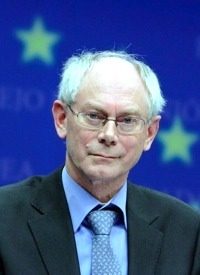
The European Union has chosen its first President, Herman Van Rompuy, the current Prime Minister of Belgium. Van Rompuy is a relatively minor political figures in Europe.
Van Rompuy comes from Belgium, a nation that has long been divided by linguistic and ethnic differences, with the Francophone Walloons and the Dutch-speaking Flemish splitting the nation roughly in half. Within Belgium, Prime Minister Van Rompuy governs a shaky coalition that was formed after one of the longest political crises in Belgian history. Perceived as weak and inexperienced at home, Van Rompuy also comes from one of the smaller nations of the European Union: his selection was widely seen as a deliberate attempt to reduce the influence of the supra-national European Union.
The selection of a well-known, savvy, and popular political figure from one of the largest nations in Europe — former Prime Minister Tony Blair of the United Kingdom was frequently mentioned — could have given the European Union a strong leader who could have moved the union toward a more effectively centralized government, rather than an international organization whose nation members still retain some sovereignty.
Van Rompuy is a center-right politician, which does not make him anything approaching a conservative in the American political tradition, but which does place him in general opposition to the overt and agnostic socialism of many European parties of the Left. He opposes the admission of Turkey, an Islamic country, to the European Union, and his foreign policy has tended to be pro-American by the standards of European politics. Those positions, along with the relatively slight personal and political power that he brings to the new position of President of the European Union, seem calculated to keep the European Union more of a confederation of partially sovereign nations, at least for the time being.
The reaction of European politicians who favor a very strong union was sour. Olivier Ferrand, a center-leftist French figure, described the selection of Van Rompuy as “jaw-dropping. It is the end of ambition for the EU — really disappointing.” Carl Bildt, a former Prime Minister of Sweden, described the choice as a “minimalist solution.”
The process of selecting Rompuy, who openly stated that he had not sought the position, was more reminiscent of the selection of a brokered candidate at an American political convention than the selection of a leader by the citizens of the European Union. If Rompuy wanted to be a robust leader, the absence of any popular electoral mandate in his selection behind closed doors by party and government leaders of European nations makes that more difficult.
Known as a consensus builder, Rompuy is likely to use the influence of his office to advance those objectives that the nations and peoples of the European Union already agree upon and then to refine those into more workable policies.
Given the political rivalries and cultural differences within and among the nations of Europe, conventional wisdom suggests that workable policies would be limited and that the European Union would have few areas of agreement strong enough to cement governments into strong collective action. Yet in defiance of political wisdom, a “free trade” arrangement known as the European Common Market has, step by step and through patient gradualism, metastasized into today’s supranational European Union that already exercises considerable political clout and can be expected to exercise more clout under the new Lisbon Treaty. The architects of a strong European government may complain that the EU and its new president are far too weak, yet their radical position will help to make any steps in that direction by concensus-builder Rompuy appear “minimalist” by comparison.
Photo of Herman Van Rompuy: AP Images



